This post may contain affiliate links. Please read our disclosure policy.
New to fonio? This recipe is the perfect place to start! It features tender fonio balls infused with warm spices and cooked in the creamiest coconut peanut butter sauce! It’s hearty, rich, and packed with bold flavors!
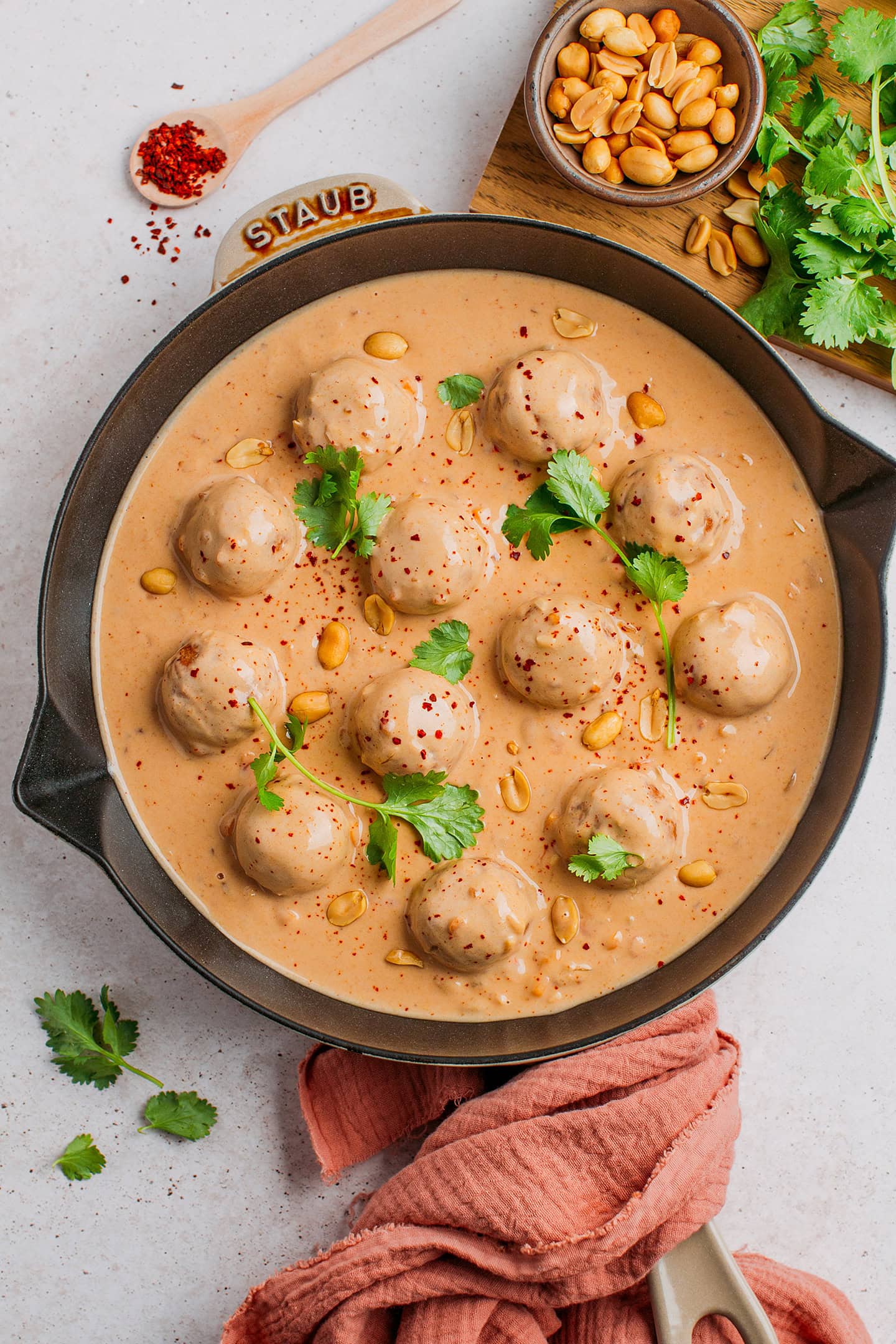
Today, I’m excited to introduce you to an underrated grain you might not have heard of before: fonio!
If you are new to it, fonio is an ancient grain that has been cultivated in West Africa for thousands of years. It’s naturally gluten-free, has a nutty, earthy flavor, and when cooked, the texture is similar to couscous. Honestly, I still wonder why I waited so long to try it!
In this recipe, I’m using fonio as a base to make vegan balls simmered in a rich and velvety-smooth peanut butter sauce. The fonio balls are super tender, a bit spicy, and infused with warm spices, while the sauce is hearty and nutty. Although this dish is inspired by African cuisine, it’s not meant to be a traditional recipe. It’s just my own twist on using fonio in a recipe, and I think it turned out pretty well!
Before starting: Please note that these fonio balls are not intended to be meaty, and they do not attempt to mimic the taste or texture of meatballs. They have more of a semolina texture, which makes them slightly sticky and quite dense, yet very tender. They somehow remind me of falafel, but softer and not as dry. If you prefer a meatier texture, don’t worry. I have also tested a version using vegan ground meat, and it turned out great! You can learn more below on this page.
⭐️ What Makes It So Good
Bold flavors. Restaurant-worthy sauce.
Just because fonio is mild, it doesn’t mean it should result in a boring dish. My solution? To generously season the fonio balls with fresh aromatics and bold spices. Think onion and garlic, as well as earthy spices like cumin, paprika, and coriander. Oh, and some harissa paste and chili powder to add a bit of heat!
Now, the fonio balls taste good on their own, but as soon as they hit the peanutty sauce, it’s game on! They level up and go straight to the final boss of flavor. As they simmer in the sauce, they absorb both the rich nuttiness and the zesty flavors of the coconut sauce.
It creates a dish that is incredibly hearty, balanced with smoky, nutty, and spicy flavors.
Simple to prepare.
This recipe is easy to prepare, even for fonio beginners. Once cooked, you process the fonio with oats, spices, and aromatics in a food processor until everything is well combined and sticky enough to form balls.
Once the balls are shaped, bake them until golden brown, and prepare the sauce in the meantime. Then, all that is left to do is to simmer the fonio balls in the sauce for a few minutes and serve!
🧅 Fonio Balls Ingredients
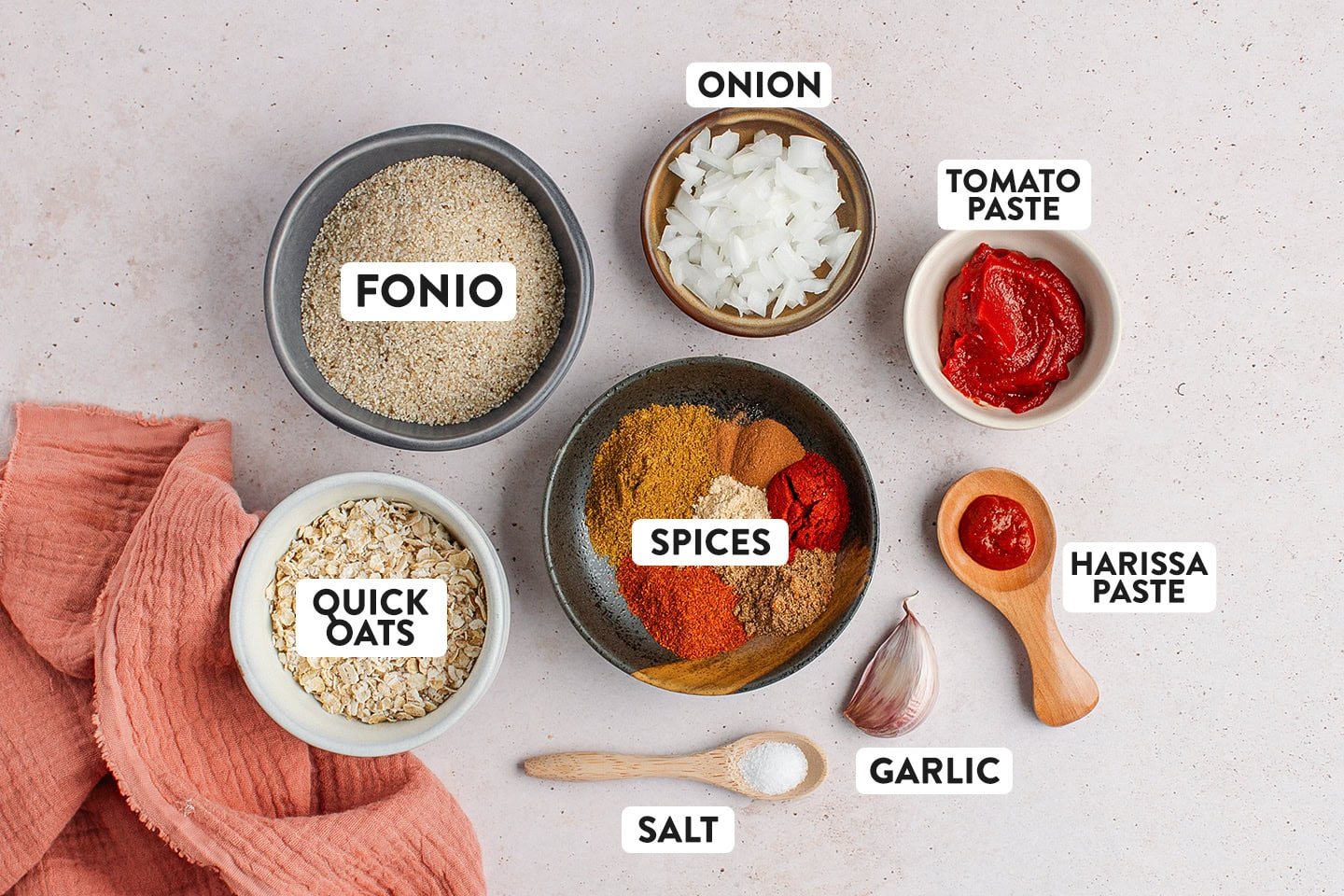
Fonio
The star ingredient of this recipe! Fonio, also known as acha, is a tiny West-African grain that resembles sand or light brown sugar. It has a mild, subtly nutty flavor, and just like rice or quinoa, it is naturally gluten-free. Fonio is often considered a superfood due to its impressive nutritional profile.
What’s great about fonio is that it cooks very quickly, in about 5 minutes.
Where to buy: You can find fonio in most well-stocked organic supermarkets or African grocery stores. You can also buy fonio online.
Oats
Although fonio is already quite sticky once cooked, I like to add some quick oats to help bind everything together and prevent the balls from falling apart.
Spices
Because fonio has a mild flavor, it needs a lot of seasoning. Here, I use a mix of spices, including ground cumin, chili powder, paprika, coriander, fenugreek, and cinnamon. They add warmth, a lot of flavor, and some heat to the balls.
Do not sweat it if you don’t have all the spices. This recipe is pretty forgiving, so use what you have on hand.
Substitute: The spices used in this recipe are inspired by Ras el Hanour and Berbere, so if you have either of those spice blends in your pantry, feel free to use them instead of the individual spices. You can swap all the listed spices for about 1 tablespoon of your preferred spice mix.
Harissa paste
For a smoky heat and a hint of tang, you will need harissa paste. It’s a North African paste that typically features chiles, garlic, and salt.
Onion and garlic
For sharpness and deeper flavors. I used 1/4 of a large onion, but you can replace it with two shallots.
Quick tip: Ensure that you finely mince your onion and garlic before adding them to the food processor. You don’t want big chunks of onion in your fonio balls.
Tomato paste
For umami, saltiness, and a hint of natural sweetness to balance the spices.
🥥 Peanut Sauce Ingredients
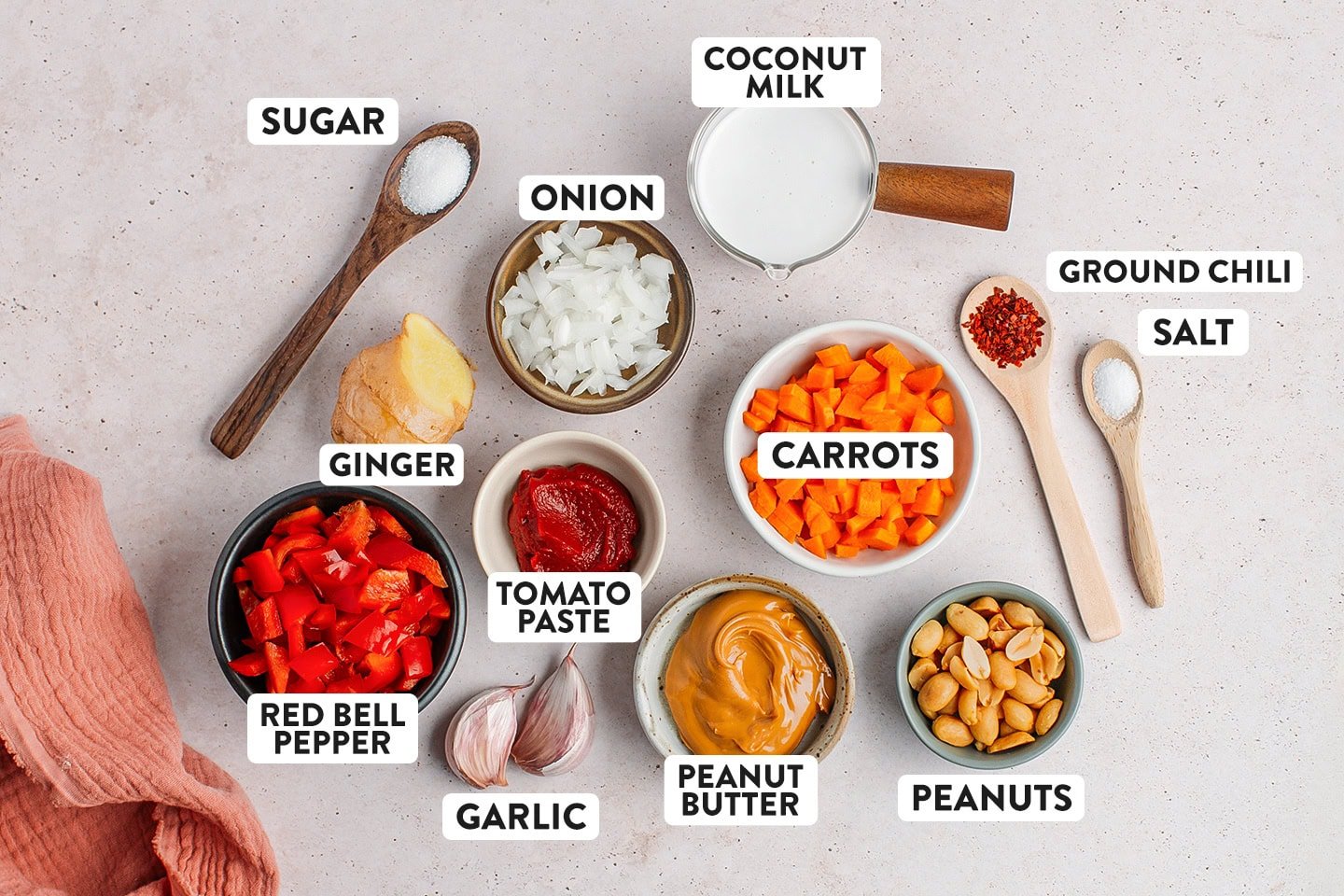
The peanut sauce starts with a base of three aromatics – onion, garlic, and ginger – that are sautéed until golden brown. Then, some diced carrots and red bell peppers join the party, not only adding sweetness but also bringing extra texture.
Finally, a can of full-fat coconut milk and a generous amount of creamy peanut butter are poured in, creating a rich, velvety-smooth sauce.
🥣 Step-by-Step Instructions
1. Prepare the balls
Want meatier balls?
Like I mentioned earlier in this post, these fonio balls aren’t meant to be meaty in texture. But if you prefer meatier balls, I have got you covered too! I tested a version with vegan ground meat, and I must say, it turned out incredibly well! Here is how to do it:
- Cook only half of the fonio (1/4 cup of fonio with 1 and 1/4 cups of water).
- Once cooked, process the cooked fonio with all of the seasonings and transfer the mixture to a bowl.
- Add 1/2 cup of your favorite vegan ground meat and mix until well combined with the fonio and seasonings. That’s it. You can then bake the balls and follow the rest of the recipe as is!
- Toast the fonio. Heat a teaspoon of oil in a large saucepan over medium heat. Add the fonio and toast for 1-2 minutes, stirring frequently.
- Cook it. Add the water and salt, and bring to a boil. Reduce to a simmer and cook uncovered until all liquid has evaporated, about 5-7 minutes.
- Process. Transfer the cooked fonio to the bowl of a food processor. Add the oats, harissa paste, minced onion, garlic, spices, and tomato paste. Process for about 10 seconds, scraping down the sides regularly until everything is well combined and the mixture is sticky enough to form balls. Taste and adjust seasonings if needed.
- Shape balls. Scoop out about 1.5 tablespoons of the mixture using a cookie scoop. Roll it between your palms to form a smooth ball. Transfer to a baking sheet lined with parchment paper. Repeat with the remaining mixture. You should end up with about 12 balls.
- Brush with oil. Lightly coat each ball with oil using a pastry brush.
- Bake. Bake the fonio balls for 15 minutes, flipping them once halfway through the baking process. In the meantime, prepare the sauce.
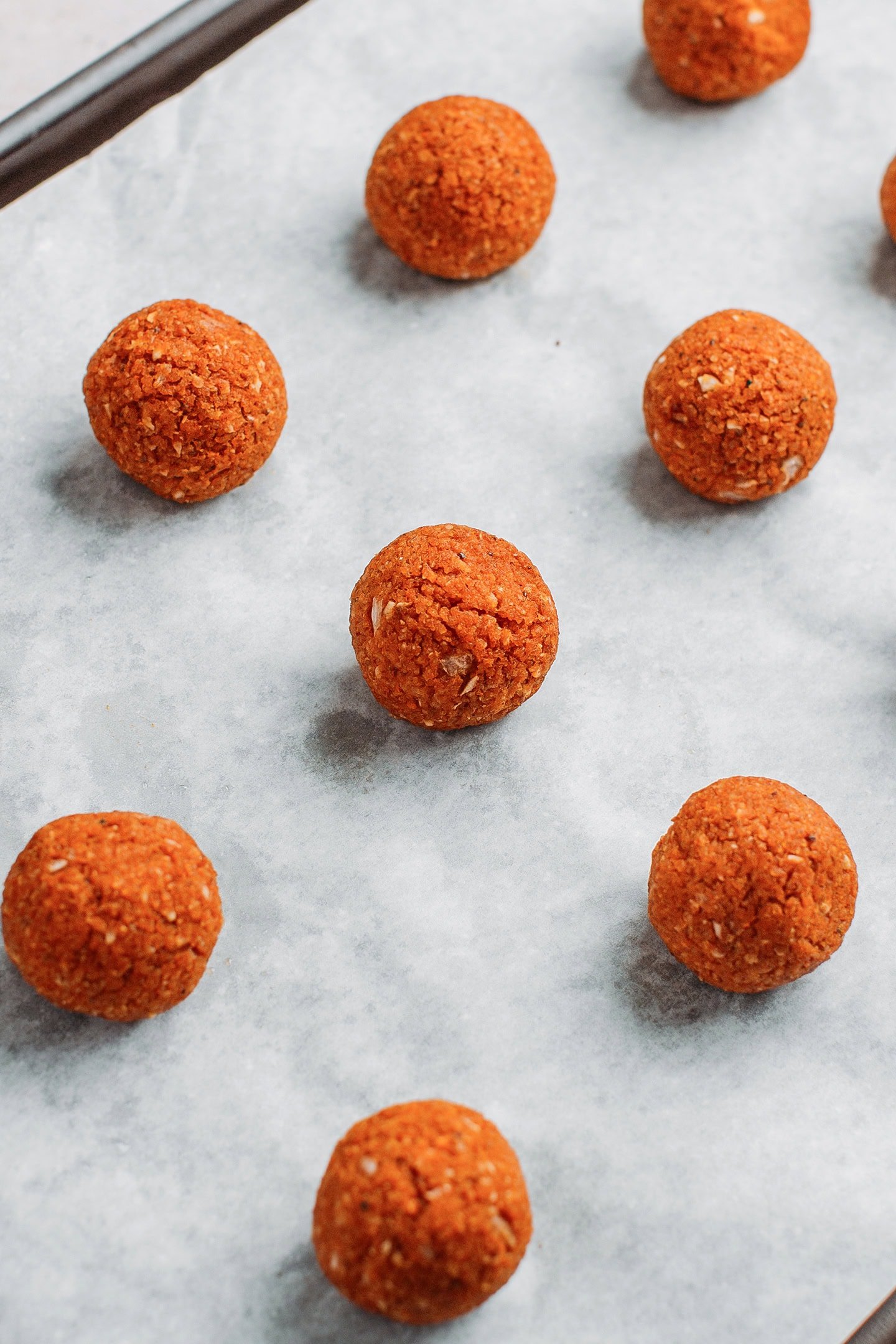
2. Make the sauce
- Sauté the aromatics. Heat the oil in a large skillet over medium heat. Once hot, add the minced onion, garlic, and grated ginger. Sauté for 1 minute.
- Add the vegetables. Next, add the diced carrots and red bell peppers, and cook for 5-8 minutes or until the carrots are tender.
- Add the remaining ingredients. Pour in the coconut milk, peanut butter, roasted peanuts, tomato paste, sugar, chili powder, and salt. Bring to a simmer and cook for about 1 minute.
- Toss the balls with the sauce. Transfer the fonio balls to the sauce and stir to coat. Cook for 2-5 minutes, stirring regularly to coat the balls with the sauce. Garnish with red pepper flakes and fresh cilantro and serve immediately!
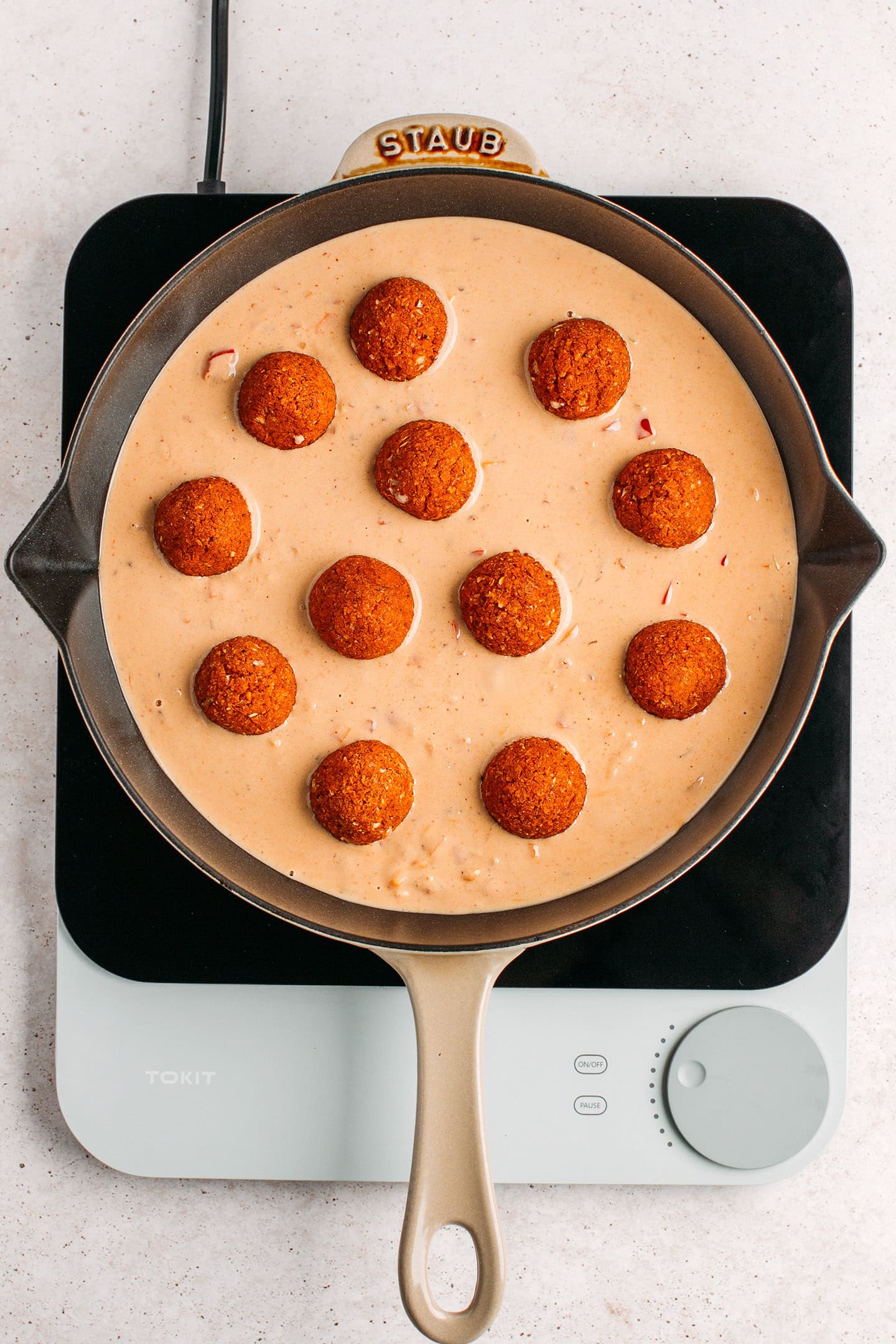
📔 Tips
Forget about the low-calorie option!
The sauce in this dish is rich, and that’s what makes it taste so good! I do not recommend reducing the amount of peanut butter or using light coconut milk. Sure, you might save a few calories, but you will miss out on that velvety-smooth consistency and depth of flavor.
Adjust the spices.
Since these balls pack a ton of spices, I understand that you might not have every single one on hand. Nothing is really set in stone when it comes to seasoning, so feel free to mix things up! You can even skip the spices you don’t like or add your favorites.
Air-fry instead of baking.
Don’t feel like turning on the oven? Instead of baking, you can air-fry the balls for about 12 minutes in a 350°F (175°C) preheated air fryer.
Thin the sauce.
If the sauce is too thick for your liking, you can thin it out by adding about 1/2 cup of water. You will also need to add a pinch of salt to balance out the extra liquid.
🍚 What to Enjoy It With
My favorite way to enjoy these fonio balls is over a bed of white rice! I know, it’s a bit like serving grains over grains, but trust me, that combo is satisfying and absolutely delicious!
For toppings, you can sprinkle some chopped fresh cilantro and extra roasted peanuts. And don’t forget a squeeze of lime to add brightness to the sauce!
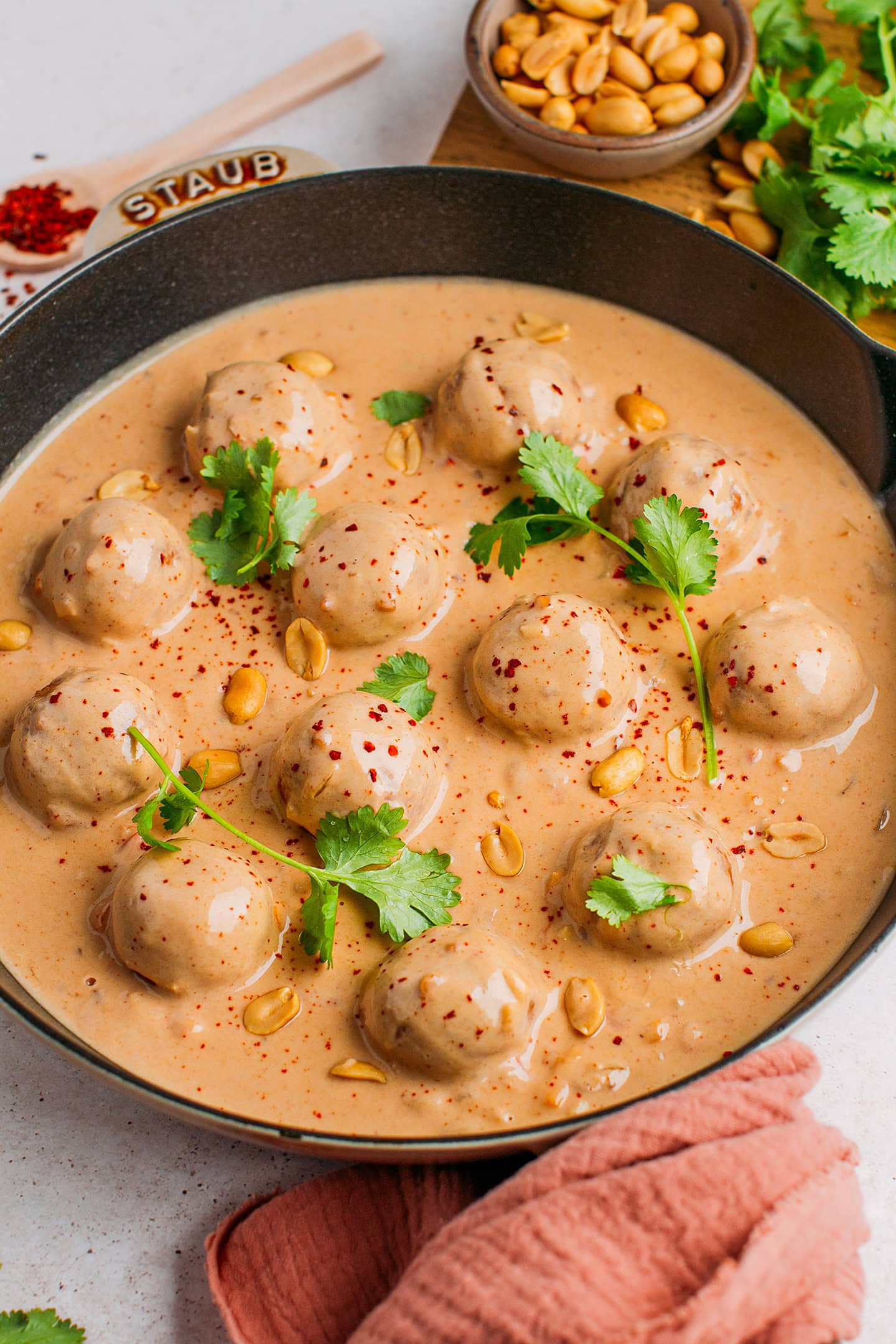
❄️ Storing and Reheating
- To store: You can store these fonio balls in the refrigerator for up to 3 days.
- To reheat: Warm in a skillet over low to medium heat for a few minutes. If the sauce has thickened too much, add a splash of water to loosen it up.
💬 FAQ
Yes! I have also tested this recipe with whole, unhulled fonio, and it worked just as well. Please note that you may need to cook it for an additional 2 minutes.
Yes, you can prepare the balls up to 2 days in advance. The same goes for the sauce. Then, on the day you plan to serve them, simply reheat everything over medium heat in a skillet for a few minutes.
You can pan-fry the balls only IF you have a non-stick skillet. Otherwise, they will likely stick to the pan.
Just like rice, it’s up to you! If you rinse it, drain it well, and skip the toasting part.
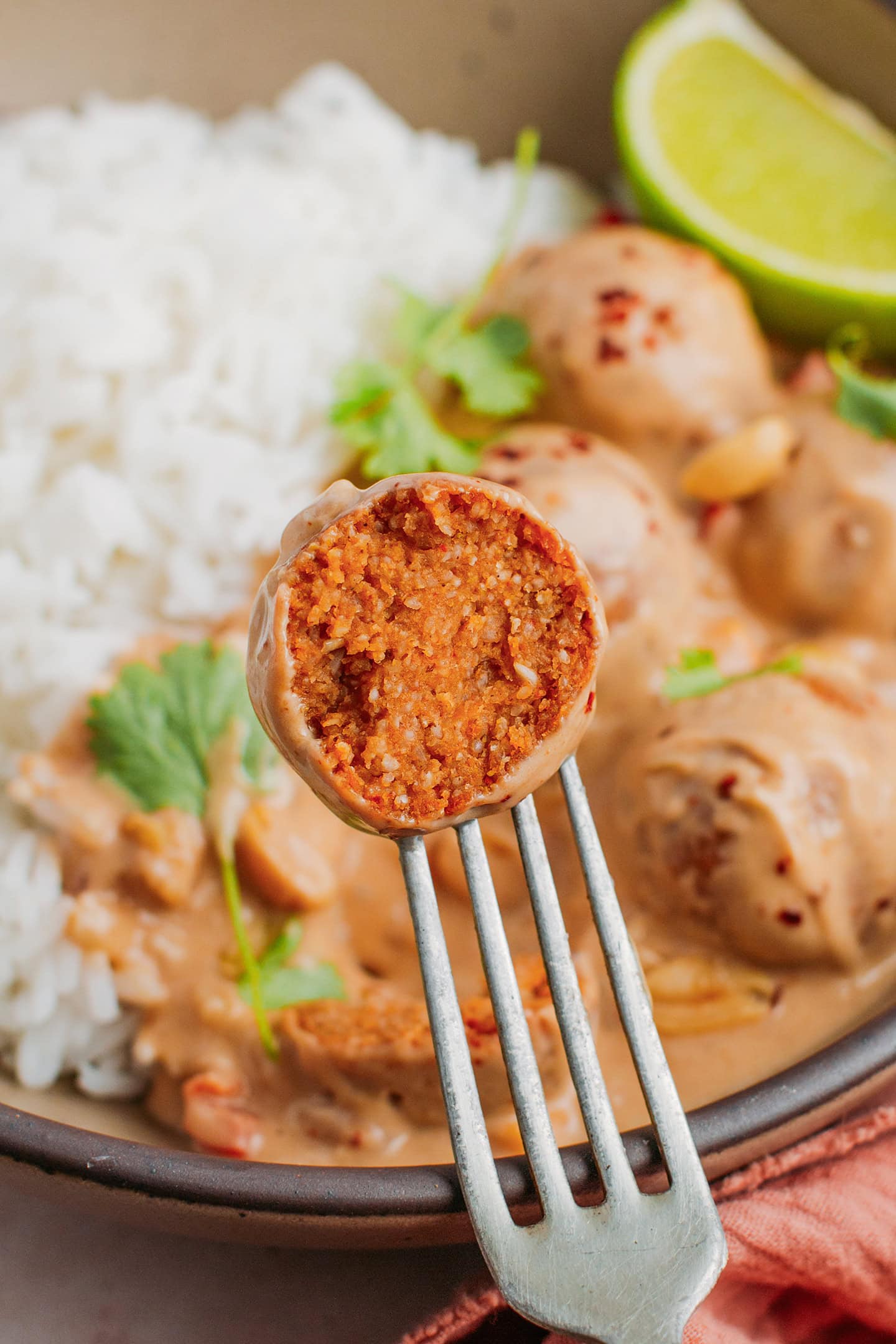
I hope you will love these fonio balls! Tender and packed with warm spices, they come with an irresistible peanut coconut sauce that will have you reaching for seconds. We particularly love to have this dish during the colder or rainy days!
🥜 More Recipes Featuring Peanuts
⭐️ Did you like this recipe? Let us know in the comments below, and tag us on Facebook, Instagram, or Pinterest!
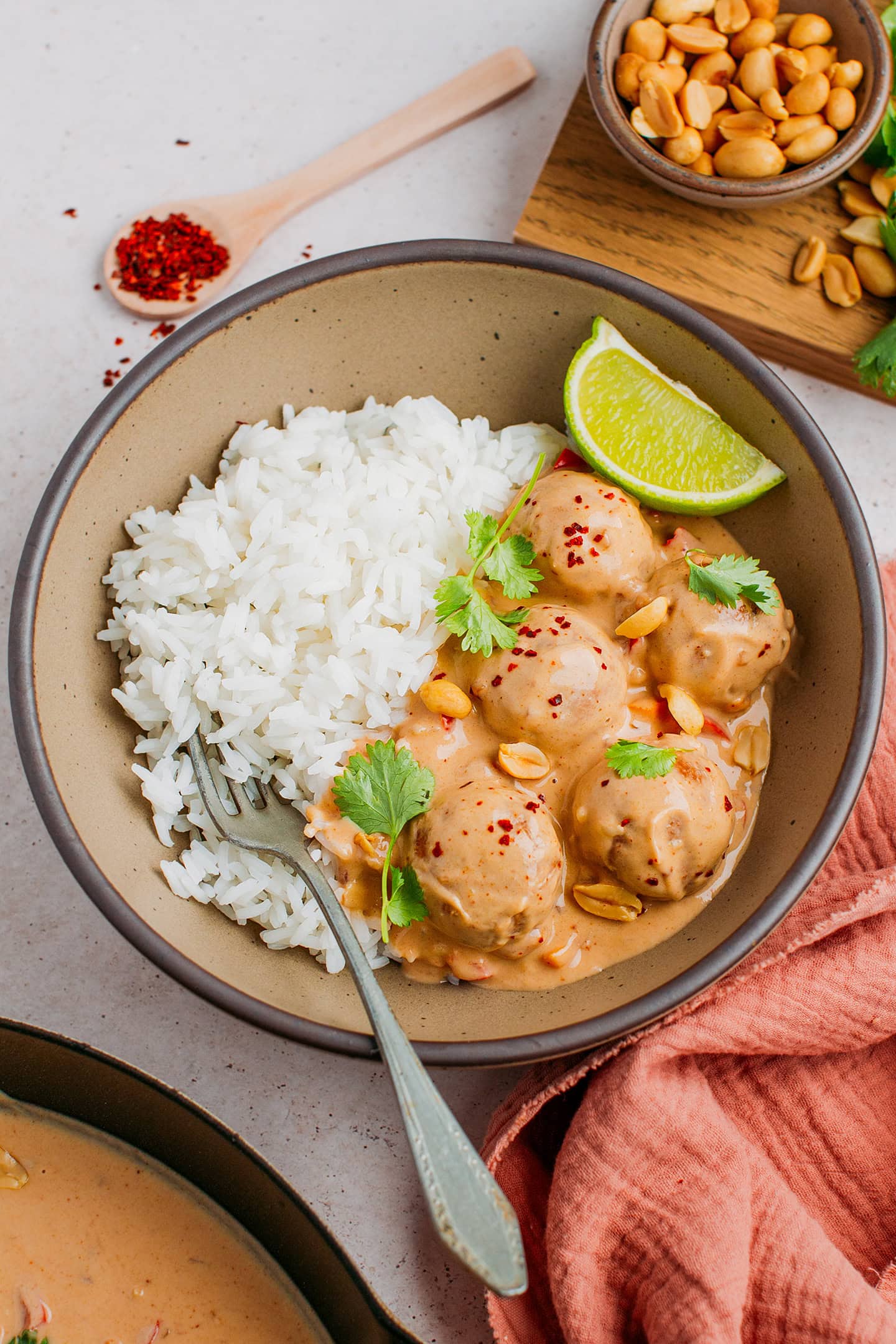

Save this recipe!
Enter your email below and I’ll send it to your inbox!
Plus, you will receive new recipes every week!

Fonio Balls in Peanut Sauce
Ingredients
Fonio Balls
- 1/2 cup (100 g) uncooked fonio
- 1 and 1/4 cup (300 ml) water
- 1/4 tsp salt
- 2 tbsp (18 g) quick oats or rolled oats
- 1/4 tsp harissa paste
- 1/4 large onion finely diced
- 1 clove of garlic minced
- 1 tbsp (14 g) tomato paste
- 1 tsp cumin
- 1/2 tsp chili powder
- 1/2 tsp each: paprika and coriander
- 1/4 tsp fenugreek
- 1/8 tsp cinnamon
- 1/8 tsp cayenne pepper
- 1/8 tsp salt
Coconut Peanut Sauce
- 1 tbsp (15 ml) oil
- 1 medium onion finely diced
- 2 cloves of garlic minced
- 2 tsp freshly grated ginger
- 1 small carrot peeled and finely diced
- 1/2 red bell pepper finely diced
- 1 13.5-ounce can (1 400-ml can) full-fat coconut milk
- 1/3 cup (80 g) peanut butter
- 1/4 cup (30 g) roasted peanuts (optional)
- 1 tbsp (14 g) tomato paste
- 1 tsp (5 g) sugar
- 1/2 tsp chili powder
- 3/4 tsp salt
- fresh cilantro for topping
Instructions
Fonio Balls
- Preheat the oven to 350 °F (175°C).
- Toast the fonio. Heat a teaspoon of oil in a large saucepan over medium heat. Add the fonio and toast for 1-2 minutes, stirring frequently.
- Cook it. Add the water and salt, and bring to a boil. Reduce to a simmer and cook uncovered until all liquid has evaporated, about 5-7 minutes.
- Process. Transfer the cooked fonio to the bowl of a food processor. Add the oats, harissa paste, minced onion, garlic, tomato paste, spices, and salt. Process for about 10 seconds, scraping down the sides regularly until everything is well combined and the mixture is sticky enough to form balls. Taste and adjust seasonings if needed.
- Shape balls. Scoop out about 1.5 tablespoons of the mixture using a cookie scoop. Roll it between your palms to form a smooth ball. Transfer to a baking sheet lined with parchment paper. Repeat with the remaining mixture. You should end up with about 12 balls.
- Brush with oil. Lightly coat each ball with oil using a pastry brush.
- Bake. Bake the fonio balls for 15 minutes, flipping them once halfway through the baking process. In the meantime, prepare the sauce.
Coconut Peanut Sauce
- Sauté the aromatics. Heat the oil in a large skillet over medium heat. Once hot, add the minced onion, garlic, and grated ginger. Sauté for 1 minute.
- Add the vegetables. Next, add the diced carrots and red bell peppers, and cook for 5-8 minutes, stirring from time to time, until the carrots are tender.
- Add the remaining ingredients. Pour in the coconut milk, peanut butter, roasted peanuts, tomato paste, sugar, chili powder, and salt. Bring to a simmer and cook for about 1 minute.
- Toss the balls with the sauce. Transfer the fonio balls to the sauce and stir to coat. Cook for 2-5 minutes, stirring regularly to coat the balls with the sauce. Garnish with red pepper flakes and fresh cilantro and serve immediately with white rice!
- You can store these fonio balls in the refrigerator for up to 3 days.
Notes
Forget about the low-calorie option!
The sauce in this dish is rich, and that’s what makes it taste so good! I do not recommend reducing the amount of peanut butter or using light coconut milk. Sure, you might save a few calories, but you will miss out on that velvety-smooth consistency and depth of flavor.Adjust the spices.
Since these balls pack a ton of spices, I understand that you might not have every single one on hand. Nothing is really set in stone when it comes to seasoning, so feel free to mix things up! You can even skip the spices you don’t like or add your favorites.Air-fry instead of baking.
Don’t feel like turning on the oven? Instead of baking, you can air-fry the balls for about 12 minutes in a 350°F (175°C) preheated air fryer.Thin the sauce.
If the sauce is too thick for your liking, you can thin it out by adding about 1/2 cup of water. You will also need to add a pinch of salt to balance out the extra liquid.Nutrition
Note: This recipe was first released in October 2017 and updated with new process shots and detailed instructions in July 2025. You can see the older photos below.

About the Author
Thomas Pagot is the founder, photographer, and recipe developer behind Full of Plants. He created the blog in 2016 as a personal cookbook for vegan recipes. Through years of recipe development, Thomas has successfully grown Full of Plants into a trusted resource for plant-based recipes.

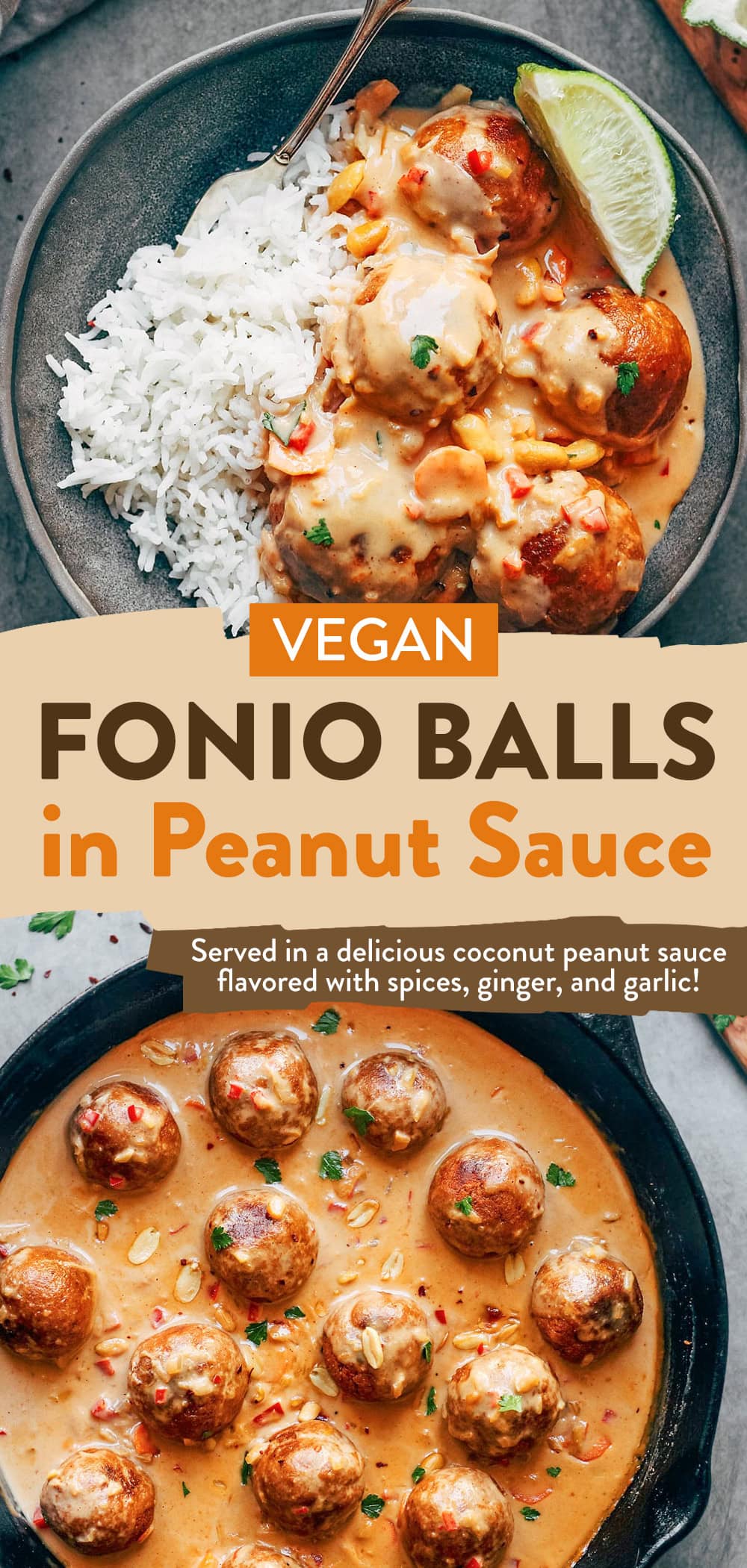

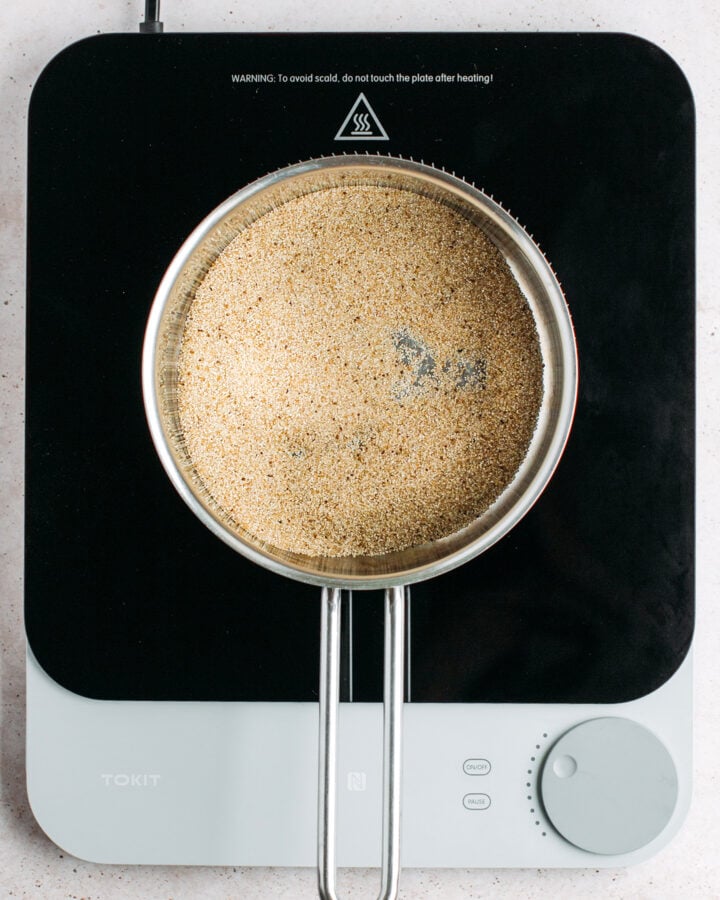
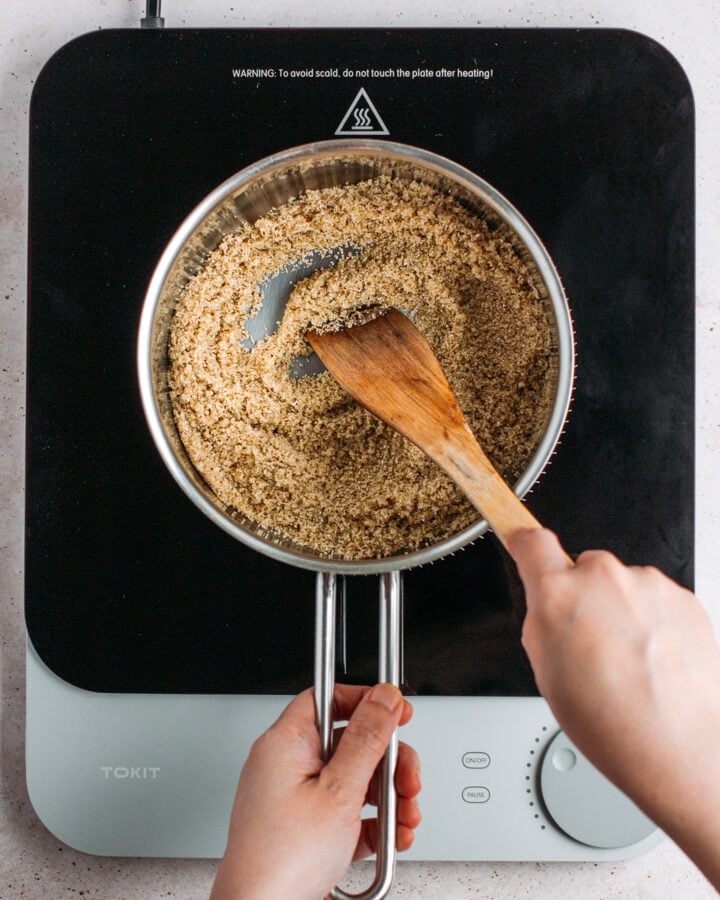
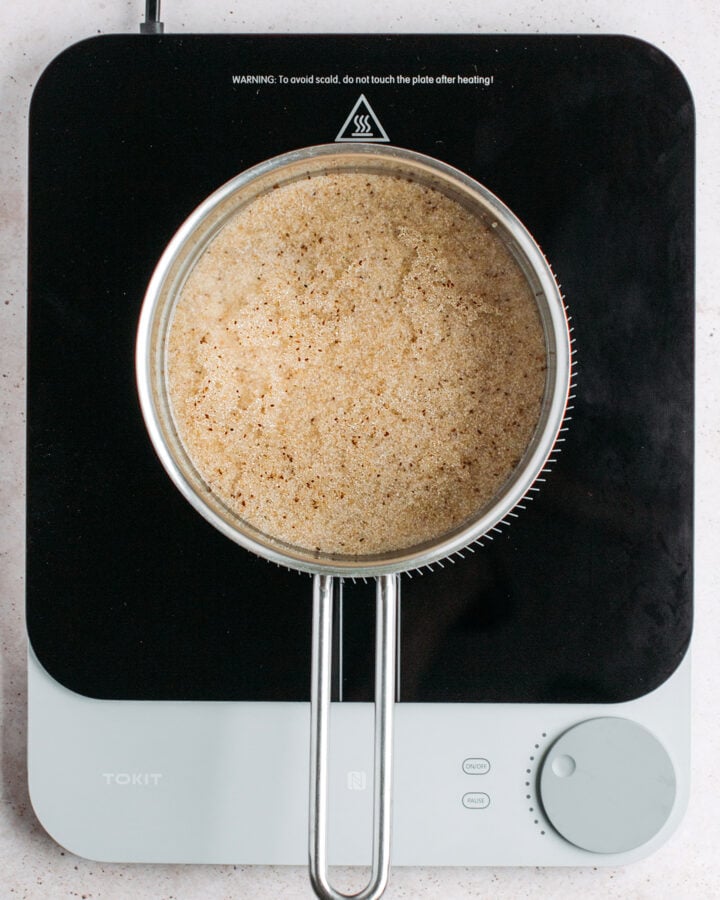
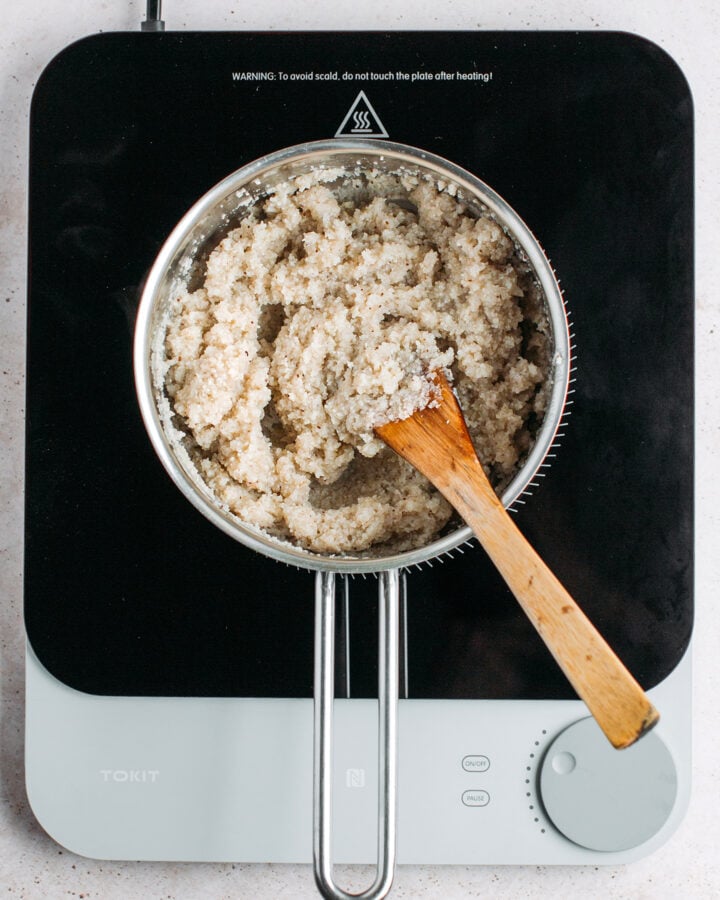
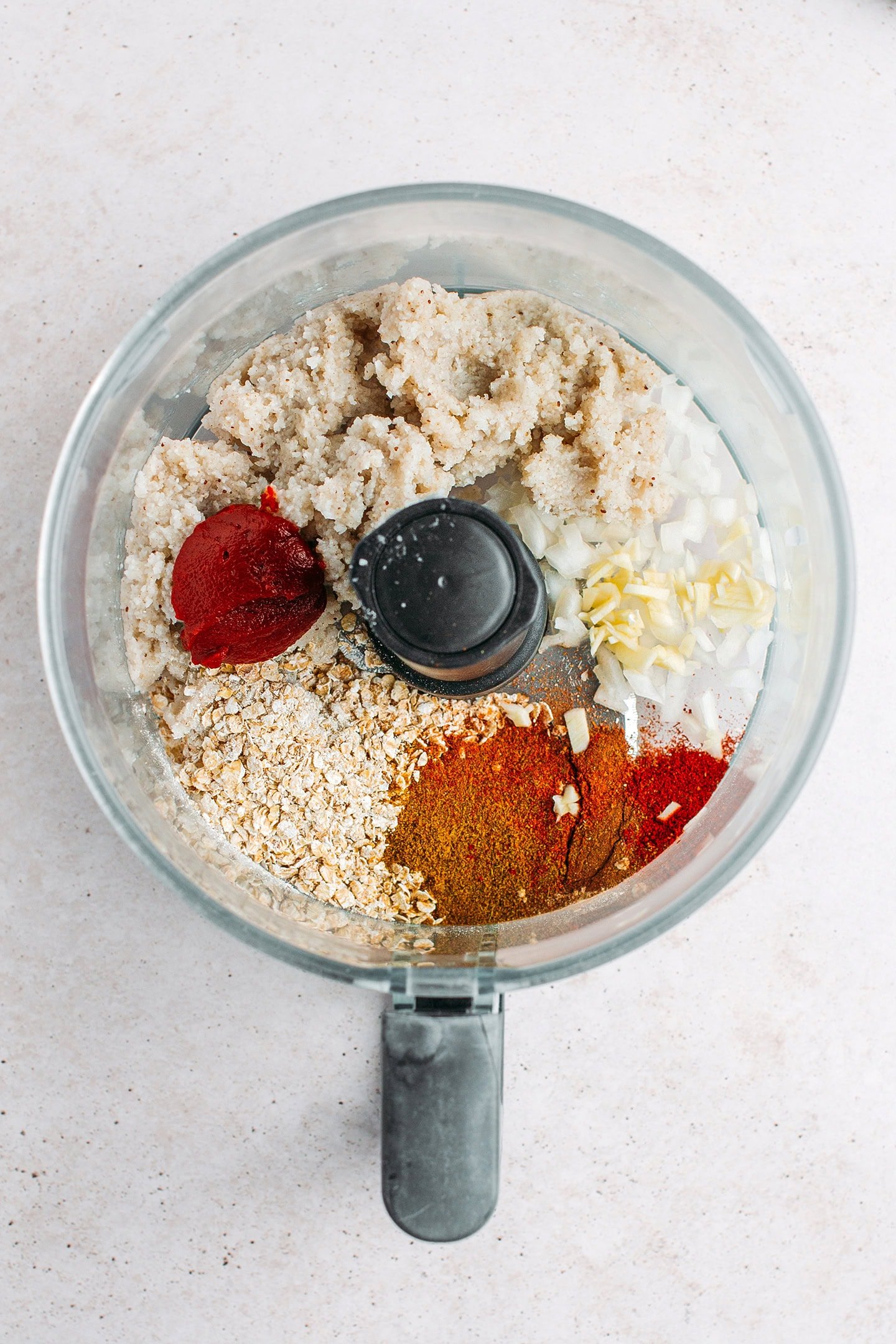
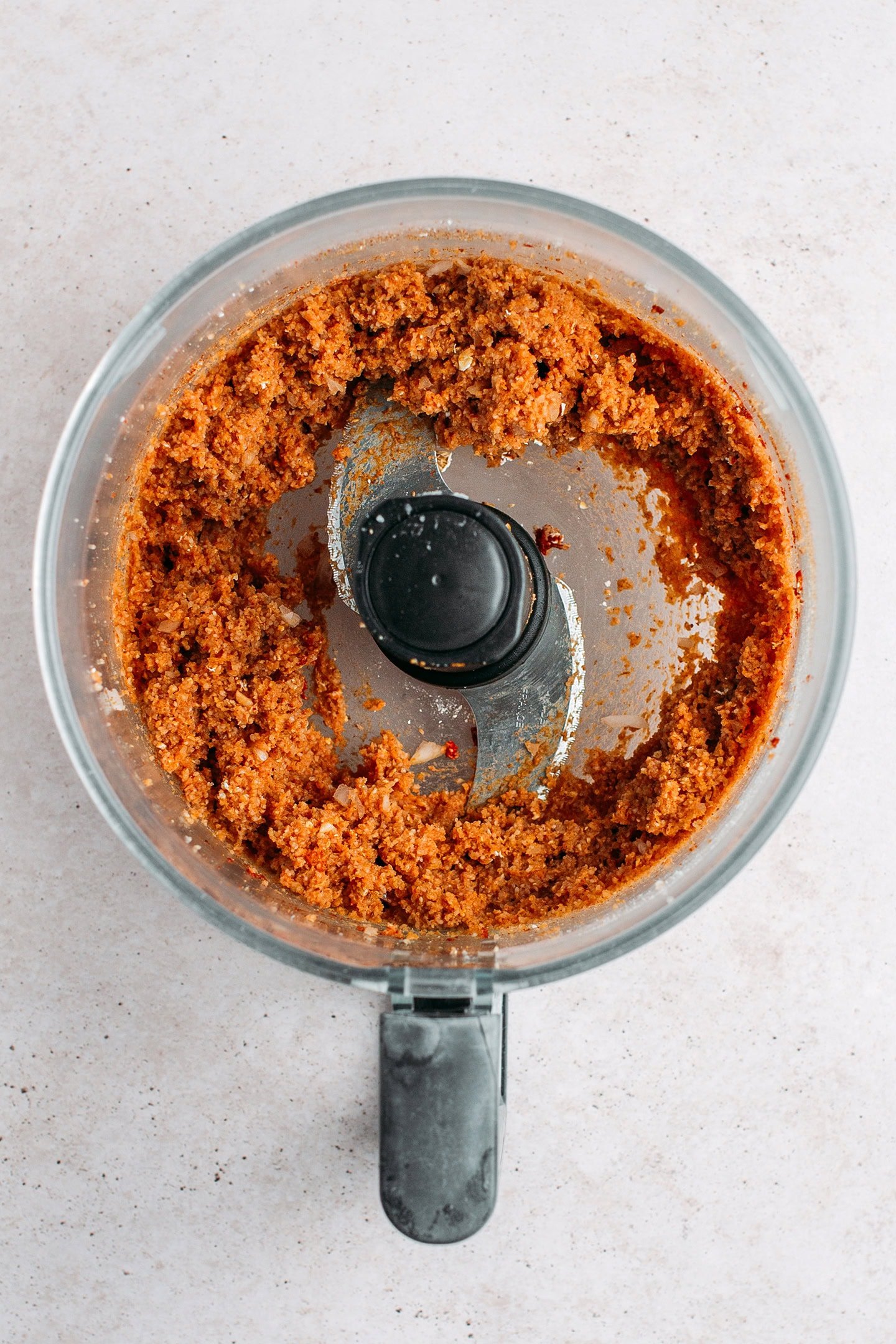
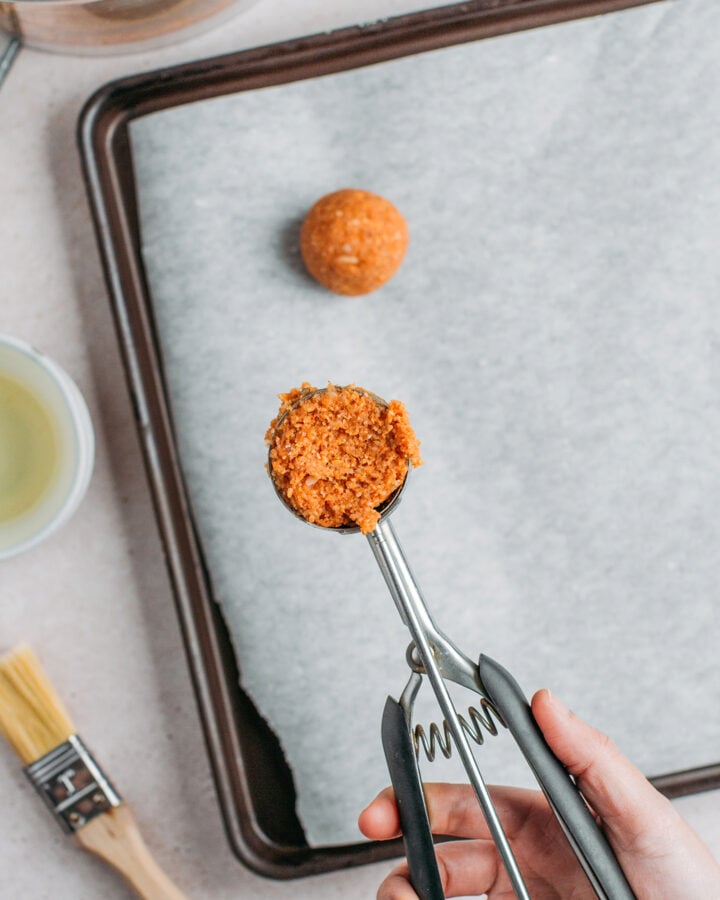
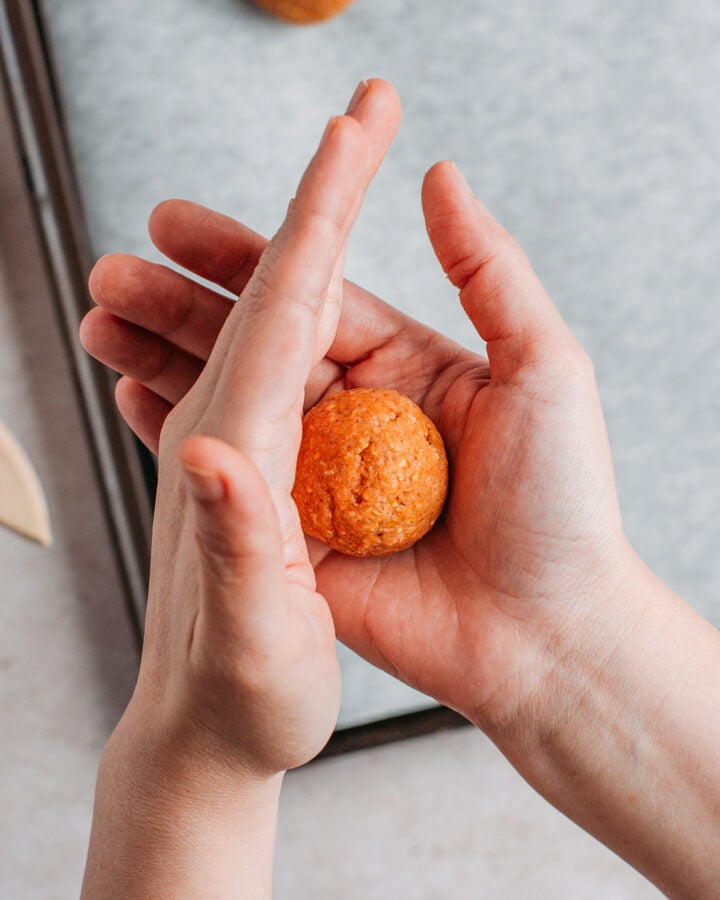
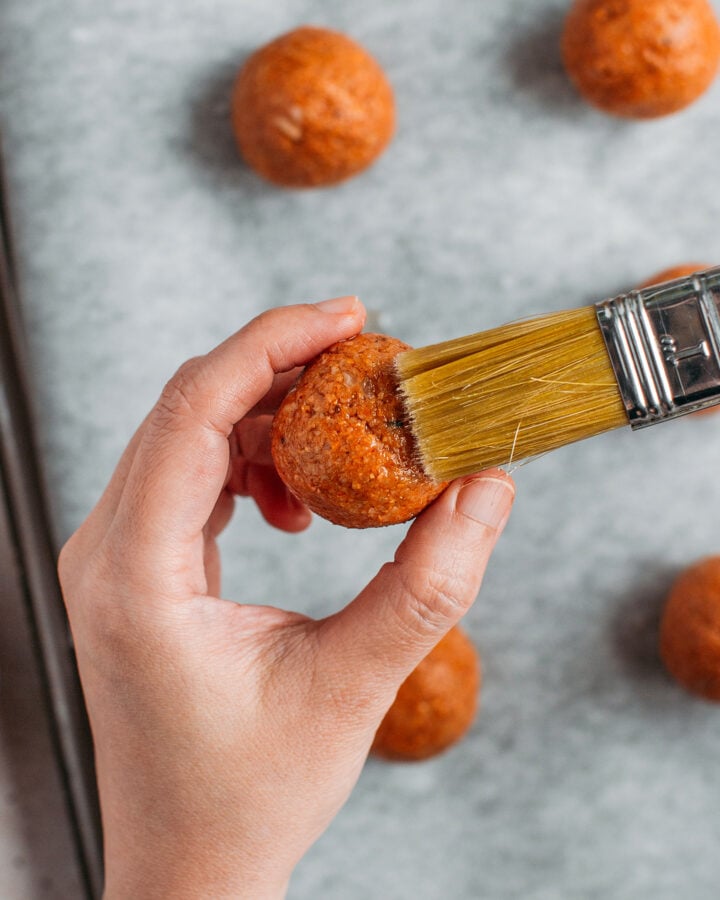
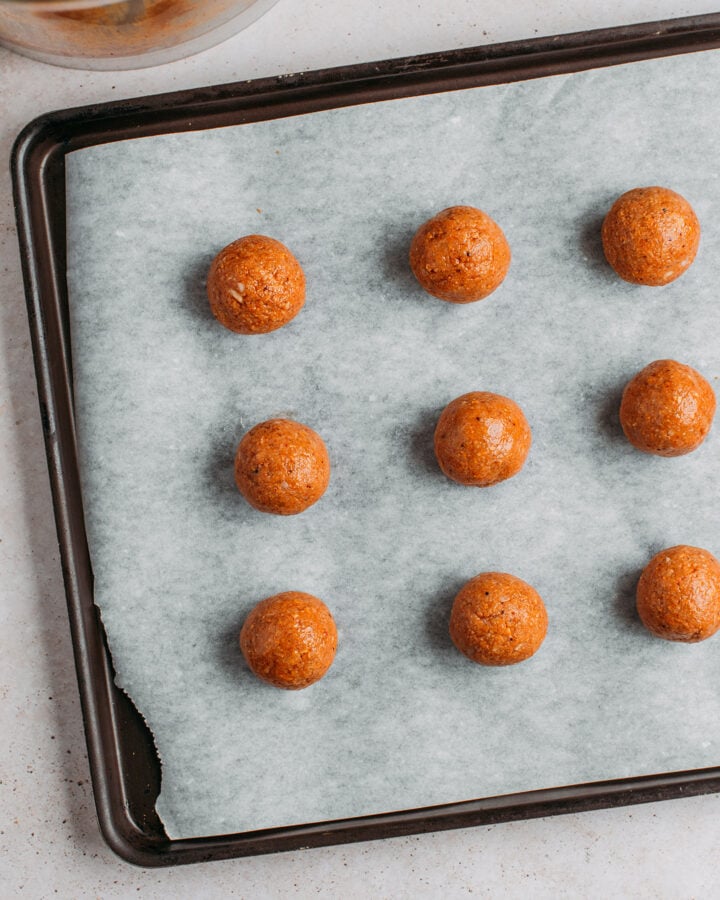
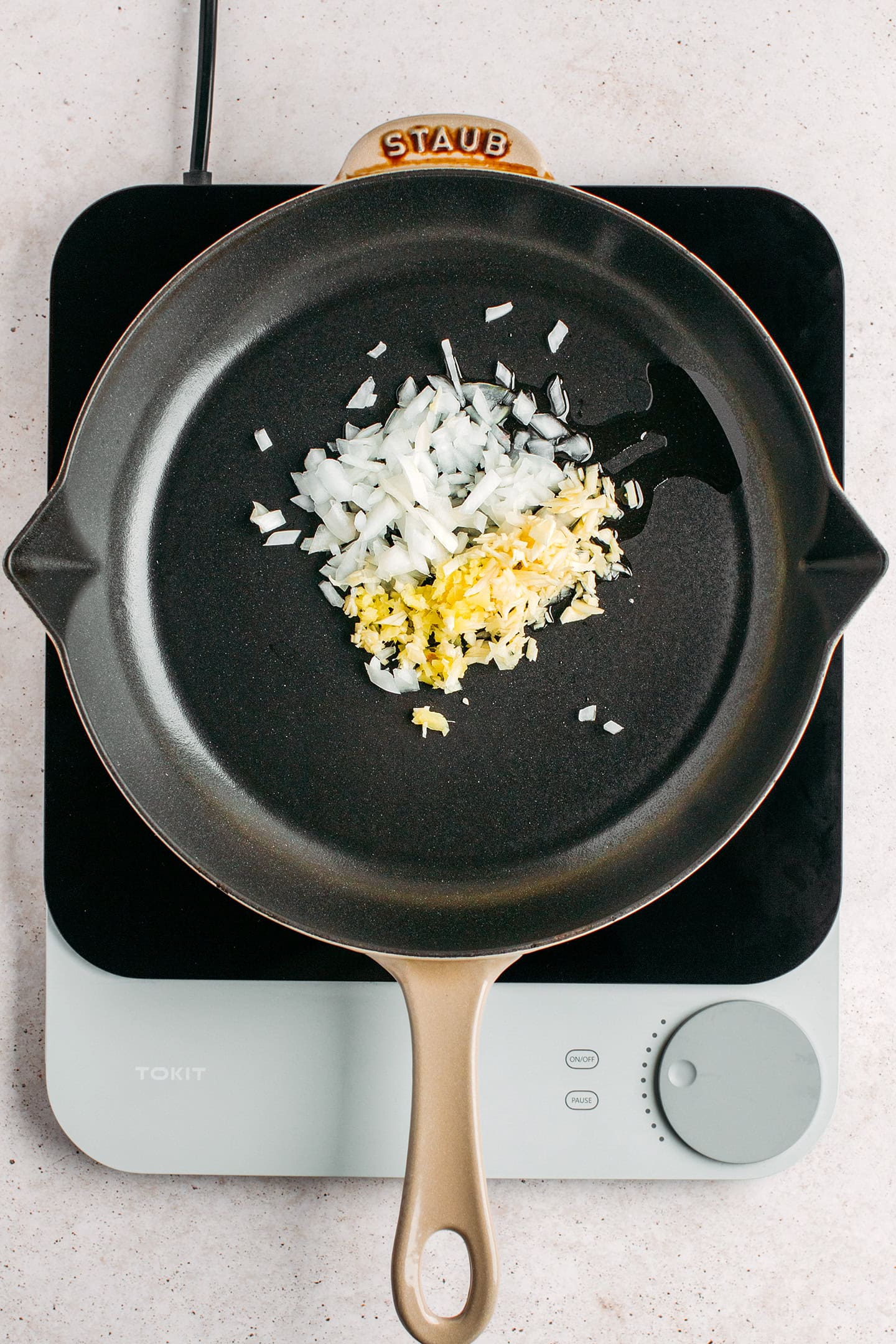
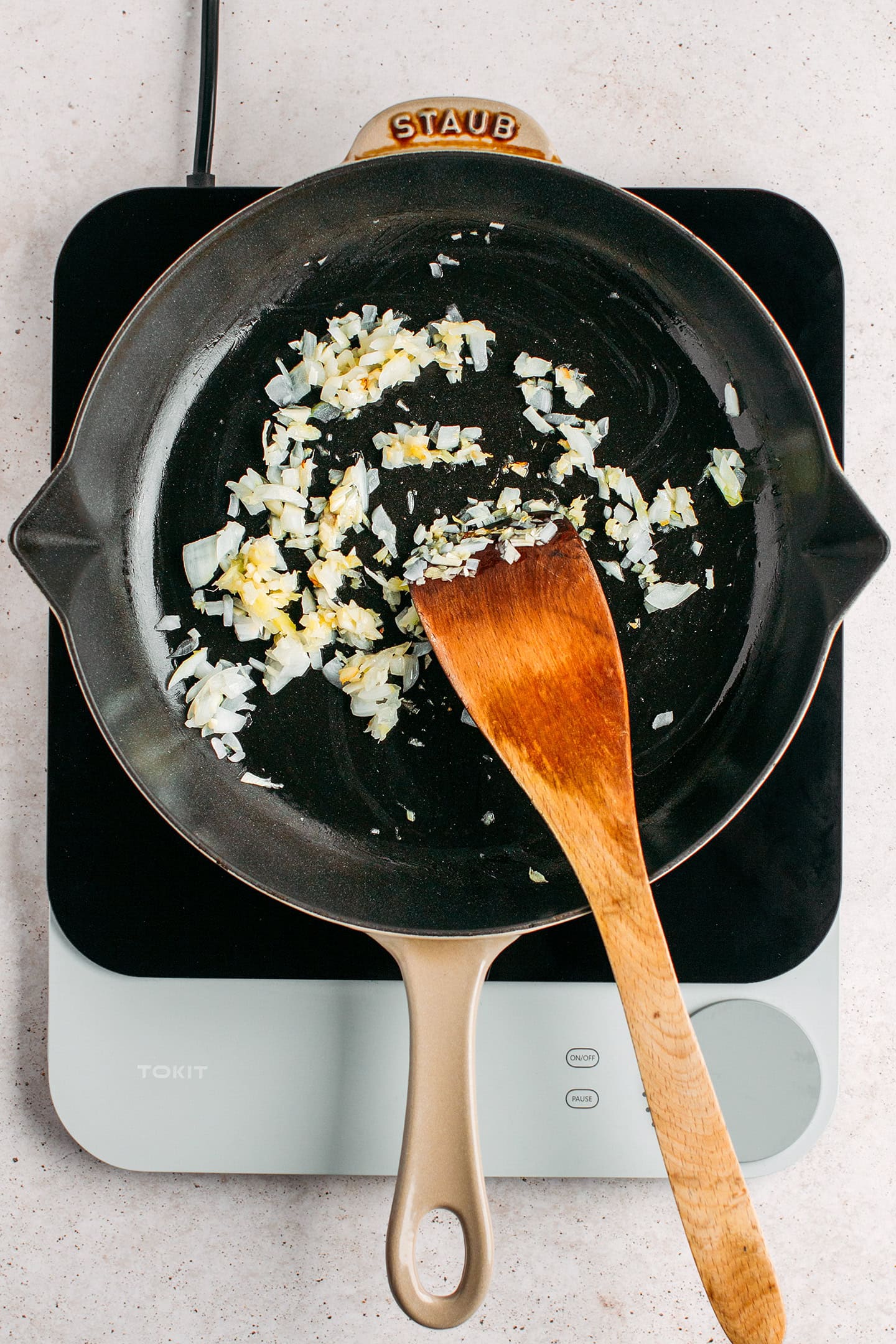
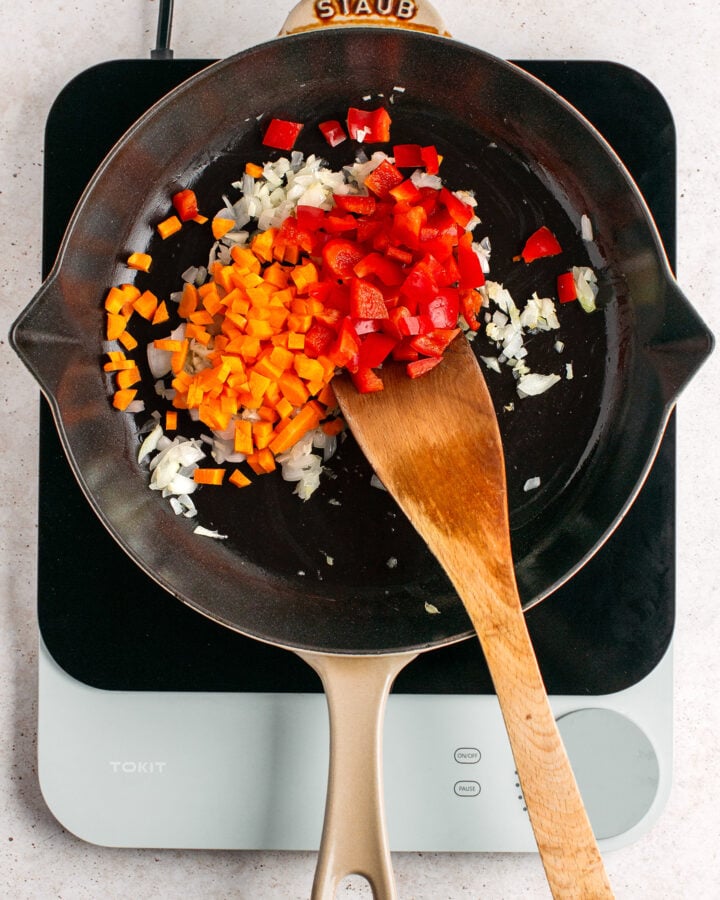
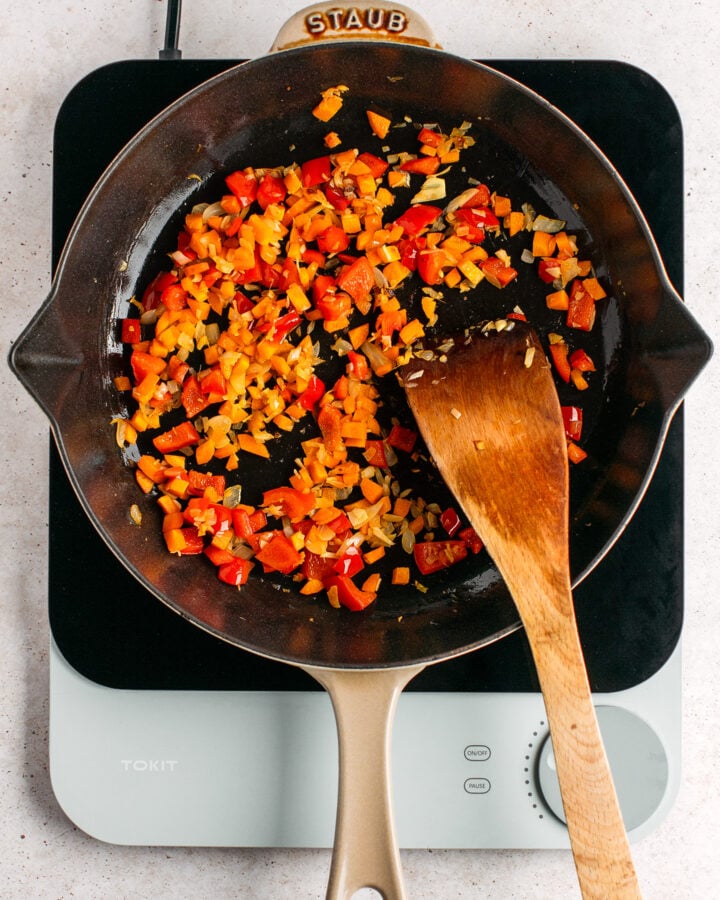
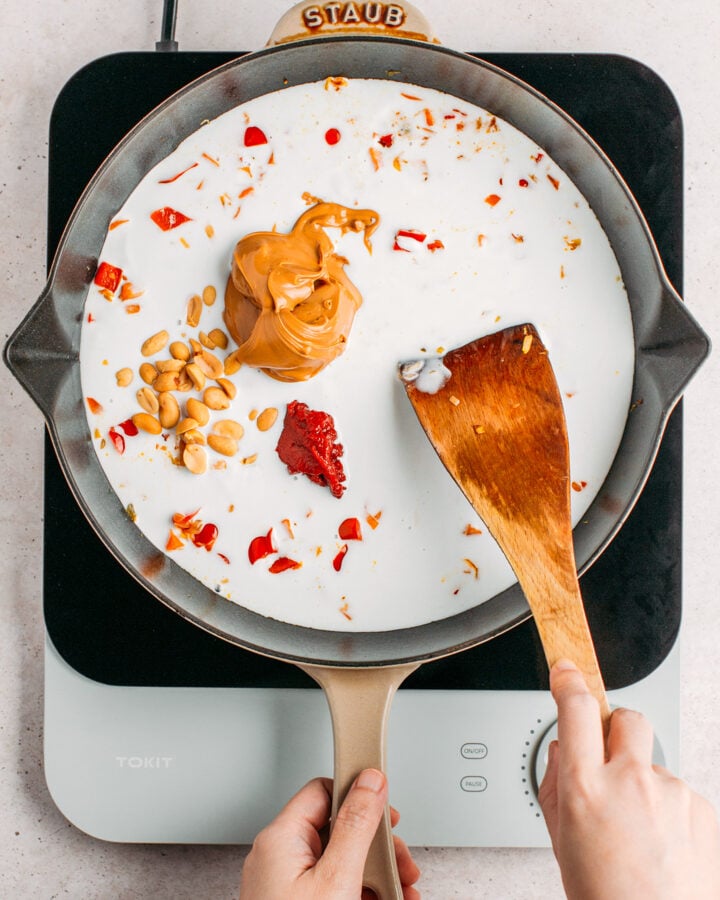
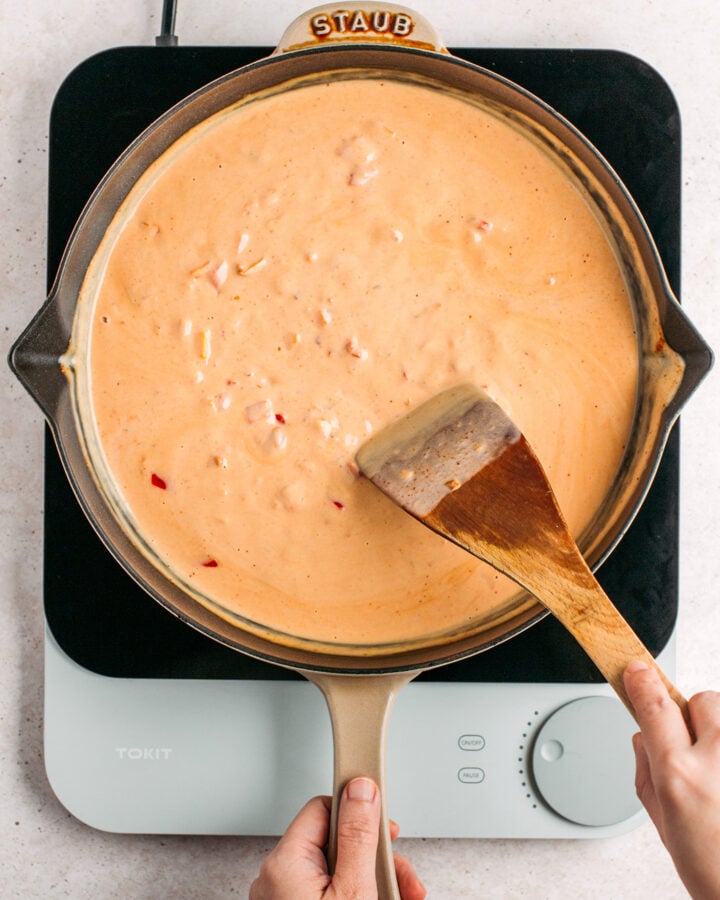



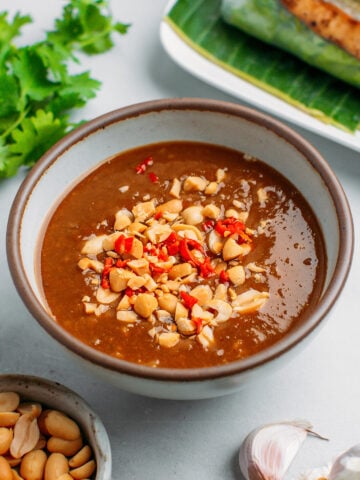


Leave a Comment
Hi, this recipe was the first one that got me into cooking with fonio. Loved it. The new photos look great, and the instructions are way clearer than before.
Thanks so much for all the effort!
Thanks for your kind words Jessie!
Could millet or quinoa be used as a substitute for fonio?
Hi Lind,
Since this is a recipe for fonio balls, I haven’t tried it with other grains, sorry. My guess is that millet might work as a substitute, but I wouldn’t recommend quinoa, as it’s not sticky enough to hold together well.
Salut Thomas, just made these, I agree the recipe makes TONS on balls. Also, next time I may add more oats, the fonio balls are quite thick and sticky. And perhaps a light blending of the sauce, to make it a tiny bit smoother. Eager to experiment with it, merci pour la recette, une découverte!
Salut !
De rien, je suis content que tu ai apprécié cette recette 😉
Hi there,
Is it possible to make the balls ahead and freeze them?
Hi Tasha,
I haven’t tried freezing the balls, so I can’t say for sure, sorry.
Great recipe! Will definitely make it again.
Thanks Hilda!
I love this! I think it’s a pretty forgiving recipe: I was missing all kinds of things from harissa to fresh ginger to red bell peppers and even the abridged version was very flavorful. The balls taste North African to me. My Ghanaian husband didn’t love them but of course he enjoyed the sauce. Our 3yo daughter had fun rolling the balls with me.
Thanks for your feedback Hélène!
I like the sauce and it was interesting trying this grain for the first time. A couple observations for those making this recipe:
Number of fonio balls: I can’t imagine how big these would be if you made only 12-14 from the amount of grain, oats, and other ingredients called for. I made 4 dozen out of the recipe; these were about the size of traditional Swedish meatballs. I thought the smaller size was good given the desire to have these absorb the flavor of the sauce (perhaps 1.5″ in diameter). Overall, it makes much more than 4 servings. I’ve had two already and hardly made a dent in the overall amount.
Sauteing the fonio balls: I found this difficult with just a little oil and had to add more–almost like a shallow deep fry–and keep it very hot to prevent the grain from sticking to the pan.
Sauce: I would have doubled the amount of sauce (or used half the fonio ball recipe) if I knew how much would be absorbed by the fonio balls. The relative amount of sauce to fonio balls is decreased dramatically the next day much as if you have pasta in a soup that absorbs the liquid.
“Temperature” of the spices. The base flavor of the sauce is good, and the peanut butter and tomato paste amounts seemed well balanced. I’m someone who typically thinks recipes are too salty and I order a medium or lower spice level at restaurants. However, I would have liked this quite a bit spicier and saltier. Next time, I will add more heat from more harissa paste, garlic, and chili pepper. I used a spicy ancho-chili pepper mix, but my harissa paste was rather mild.
Thanks for your deep feedback!
Am sooo curious to try fornio – ( never heard of it before) the recipe sounds awesome… can you suggest an alternative ?
I would think wheat semolina would make a good alternative, but you won’t have the same nutty/earthy flavor.
Hi! Didn’t care for the “meatball”, I’m not a huge grains fan. So no reflection on your recipe…..but the sauce is to die for! Not a huge pb fan but this is amazing. You might wonder if I don’t care for grains and pb why would I make this recipe lol someone else made it at work for our vegan option today.
Hi June,
Glad you liked the sauce 🙂 Thanks for your feedback!
as an answer to ‘wash’/rinse foni or not…
Like rice you can rinse the foni and the effect in both cases is it will be ‘less sticky’ after rinse… so in this recipe I suggest not to rinse because you want them sticky to form balls….
Yes please more fonio recipes ! Fonio grain pancakes ? 🙂
Will take into consideration 🙂
It has been deleted already.
I have made this recipe and it’s outstanding. But I have one question. Fenugreek seeds or leaves?
Thanks Beth! 🙂 Fenugreek powder, or dried leaves ground into a powder.
I can’t wait to try this!!
Hi Eva,
You are right, I absolutely don’t mean it the way many people think, that’s why I decided to remove it.
I do believe though that words, no matter where they come from (except very few ones), can be perceived as offensive or not, it all depends on your perspective.
I just re-read the blog post, and I see that you have already removed the word “barbarian.” Thank you. It makes a big difference.
I just re-read the blog post and saw that you have already removed the word “barbarian.” Thank you. It makes a big difference.
This is from Merriam-Webster’s Dictionary:
https://www.merriam-webster.com/dictionary/barbarian
Wikipedia also has different meanings, anyway it has been removed.
I’m eager to try this recipe. What kind of chile are you referring to when you say “ground chili?” Where I am, there is a huge variety of chiles that are available in ground form. If you don’t know specifically what type of chile it is, what is the flavor like? Is it hot? Sweet? Smoky?
I’m referring to chili mix spice that usually also contains cumin. It’s hot but not as hot as cayenne pepper powder.
Ever tried baking the balls instead of frying?
I have never tried, but these are not deep-fried so it doesn’t absorb too much oil.
I replaced the fonio with millet and it was Delicious! Perfect and comforting for this cold weather.
Thank you!
Thanks Sara!
Do you think that quinoa would work with this recipe, if so what if any changes should be made?
I’m afraid the balls would fall apart if using quinoa.
This looks good. I have just come across this grain and went looking for recipes. Several other posts suggest washing fonio before use. What do you think? If I wash it, even with draining well, it will be pretty wet and not very amenable to toasting. Any recommendations or thoughts about rinsing the fonio and then toasting it? Thanks
I would try toasting it and then washing, or just skip the toasting process, it should still taste good 😉
Hi Thomas, I slightly changed your recipes. I added some fish sauce instead of salt and added the zest and juice of 1 lime to add some acidity and decrease a bit the fatness of the peanut butter and coconut milk. Very nice and tanks for the inspiration. I bought my first bag of Folio 2 days ago and was looking for ideas when I found your recipe. You look very young so congratulations for the creativity.
Hi Enrica,
Thanks for sharing your tweaks 😉 Happy to hear you liked the recipe!
Ah, yes I have to update my photo, it’s a few years old now 🙂
Hey Thomas
Do you think I can use Bulgur instead of the fonio to make these balls?
Dish looks delicious, hopefully I’ll make it this evening 😉
grts
Hey Maarten, yes I think bulgur will be a great substitute!
So creative + beautiful!
Thanks Dana!